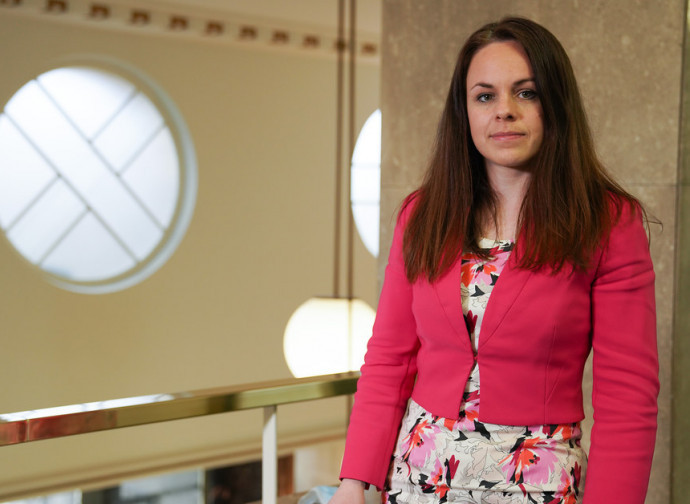Scotland: Forbes under attack for Christian beliefs but ahead in polls
There are three candidates for the SNP leadership: the winner will succeed the outgoing Scottish Prime Minister Nicola Sturgeon. The media attack Kate Forbes, 'guilty' of defending marriage. The outgoing prime minister supports the Muslim - pro 'gay marriage' - Humza Yousaf.

There will be three candidates for the leadership of the SNP, the Scottish National Party; the winner is expected to be confirmed as First Minister in place of the outgoing Nicola Sturgeon. Nominations for the position of the next SNP leader and Scottish First Minister closed at noon yesterday. The three candidates are Scottish Health Secretary, Humza Yousaf; Finance Secretary, Kate Forbes; and former Community Safety Minister Ash Regan.
The vote, already contested, will take place in party seats and the result will not be announced until next month, on 27 March. The election campaign has so far been dominated, a few days after Sturgeon’s resignation, the reasons for which we have described in The Daily Compass, by a 'targeting' of Kate Forbes' for her views on gay marriage, transgender rights, and abortion; a stomach-churning and illiberal tirade against the 32-year-old candidate.
Even before Forbes formally announced she was in, the media were furiously debating the central issue of her candidacy: what does Kate Forbes think about premarital sex, pro-LGBTI educational reforms, and abortion? Kate Forbes privately believes (as do most people in the history of mankind) that marriage is between a man and a woman, that privileges cannot be introduced for transgender people at the expense of the rights of girls and women, and that this is not OK in the year 2023, even if it has no implications for gay rights or public policy.
Forbes, the country's Finance Minister and a member of the Free Church of Scotland, was and remains ahead of her rivals, even after statements that she would not have voted in favour of same-sex marriage, legalised in Scotland in 2014. The controversies stirred up by her views on abortion, that having children outside marriage is wrong, and that a trans woman is a biological man, have not at all reduced her support among the party's voters; but for the establishment, LGBTI lobbies, and the mass media Forbes has certainly become the enemy to be taken down. In the poll published by Opinion Matters and released yesterday, which was answered by SNP voters and party members who will vote for the next leader, Forbes received 28% support, with an 8% lead over Yousaf and 7% over Regan, but a third of voters are still undecided. Forbes, defended to the hilt in recent days by both the Scottish Catholic Church and the Free Church of Scotland, says she is absolutely certain that “it is possible to be a person of faith and defend the rights of others to have no faith or to have a different faith” and, at the moment, the majority of her voters believe this too.
However, the fierce controversy over Forbes' Christian morality is the consequence of the grotesque modern form of discrimination against any testimony of Christian culture and traditions, which is unacceptable in today's illiberal society.
It is no coincidence that, in the Scotland revolutionised by Sturgeon over a twenty-year period, there is a systematic eradication of religion in general and the Christian faith in particular (in 2011 53% of people in Scotland identified themselves as Christian, while in 2022 this percentage had fallen to 33%). In fact, the doctrinal, social, and civic model imposed by Nicola Sturgeon, supported by the LGBTI and abortionist lobbies and prevalent in most Western countries, stipulates that politicians must prove that they have no Christian convictions and/or can abjure them before they can hold high public office and, sometimes, sit in parliament. We are seeing this with the treatment of Kate Forbes so far, but since the 'Buttiglione case' in 2004 to the present day, there are many examples and facts that prove the gradual marginalisation and discrimination of Christian believers.
Mrs Ash Regan, another candidate, was the first minister in Scottish history to resign; she did so on 27 October for reasons of conscience, after the parliamentary debate and vote on the Gender Recognition Reform Bill (legislation on sexual gender self-identification), saying she was incompatible with a government that endangered women and their rights. In announcing her candidacy to the Sunday Mail, she stated that with her at the helm, “women's rights will never be compromised” and that she would focus on public services and the economy rather than on “new laws that hamper business and interfere with family life”.
The third candidate, strongly supported by Nicola Sturgeon, is Islamist Health Minister Humza Yousaf, who voted in favour of the Gender Self-Identification Bill, said he was “an advocate of egalitarian marriage, proud to be Muslim” and did not consider faith to be an inspiration for political engagement. However, as well as being at the centre of the raging controversy over the management of Scotland's healthcare system and post-Covid emergencies, Yousaf was deliberately absent from the Chamber in 2014, when 'gay marriage' was passed. Meanwhile, it is the entire Sturgeon family that is under indictment: in addition to First Minister Nicola's endorsement of the Muslim Yousaf, candidate Ash Regan has denounced the “clear conflict of interest” of Peter Murrell, Nicola Sturgeon's husband and SNP party leader, who will be in charge of running the election.
